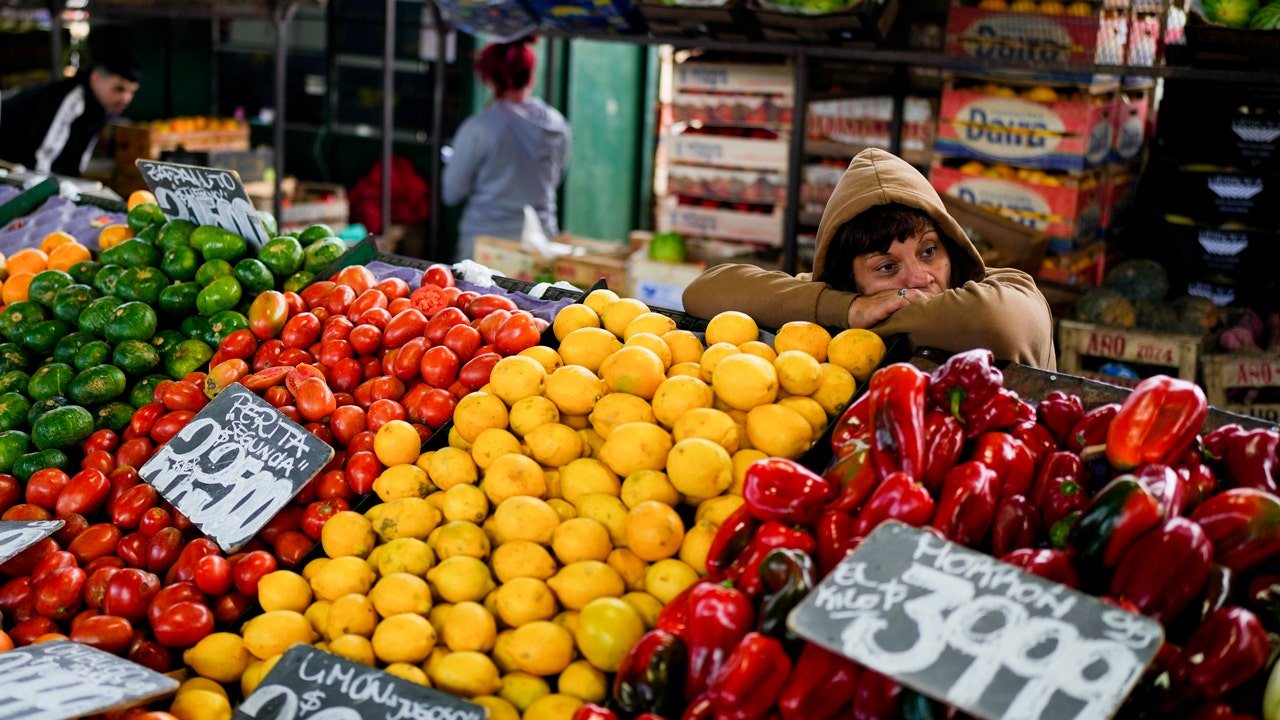INTERNACIONAL
Argentina reports its first single-digit inflation in 6 months as markets swoon and costs hit home

Argentina’s monthly inflation rate eased sharply to a single-digit rate in April for the first time in half a year, data released Tuesday showed, a closely watched indicator that bolsters President Javier Milei’s severe austerity program aimed at fixing the country’s troubled economy.
Prices rose at a rate of 8.8% last month, the Argentine government statistics agency reported, down from a monthly rate of 11% in March and well below a peak of 25% last December, when Milei became president with a mission to combat Argentina’s dizzying inflation, among the highest in the world.
ARGENTINA WILL GET NEXT INSTALLMENT OF BAILOUT AS IMF PRAISES MILEI’S AUSTERITY POLICIES
«Inflation is being pulverized,» Manuel Adorni, the presidential spokesperson, posted on social media platform X after the announcement. «Its death certificate is being signed.»
Although praised by the International Monetary Fund and cheered by market watchers, Milei’s cost-cutting and deregulation campaign has, at least in the short term, squeezed families whose money has plummeted in value while the cost of nearly everything has skyrocketed. Annual inflation, the statistics agency reported Tuesday, climbed slightly to 289.4%.
«People are in pain,» said 23-year-old Augustin Perez, a supermarket worker in the suburbs of Buenos Aires who said his rent had soared by 90% since Milei deregulated the real estate market and his electricity bill had nearly tripled since the government slashed subsidies. «They say things are getting better, but how? I don’t understand.»
A vendor waits for customers at the central market for fruit and vegetables in Buenos Aires, Argentina, Friday, May 10, 2024. (AP Photo/Natacha Pisarenko)
Milei’s social media feed in recent weeks has become a stream of good economic news: Argentine bonds posting some of the best gains among emerging markets, officials celebrating its first quarterly surplus since 2008 and the IMF announcing Monday it would release another $800 million loan — a symbolic vote of confidence in Milei’s overhaul.
«The important thing is to score goals now,» Milei said at an event Tuesday honoring former President Carlos Menem, a divisive figure whose success driving hyperinflation down to single digits through free-market policies Milei repeatedly references. «We are beating inflation.»
Even so, some experts warn that falling inflation isn’t necessarily an economic victory — rather the symptom of a painful recession. The IMF expects Argentina’s gross domestic product to shrink by 2.8% this year.
«You’ve had a massive collapse in private spending, which explains why consumption has dropped dramatically and why inflation is also falling,» said Monica de Bolle, a senior fellow at the Peterson Institute for International Economics who studies emerging markets. «People are worse off than they were before. That leads them to spend less.»
Signs of an economic slowdown are everywhere in Buenos Aires — the lines snaking outside discounted groceries, the empty seats in the city’s typically booming restaurants, the growing strikes and protests.
At an open-air market in the capital’s Liniers neighborhood, Lidia Pacheco makes a beeline for the garbage dump. Several times a week, the 45-year-old mother of four rummages through the pungent pile to salvage the tomatoes with the least mold.
«This place saves me,» Pacheco said. Sky-high prices have forced her to stick to worn-out clothes and shoes and change her diet to the point of giving up yerba mate, Argentina’s ubiquitous national drink brewed from bitter leaves. «Whatever I earn from selling clothes goes to eating,» she said.
Argentina’s retail sales in the first quarter of 2024 fell nearly 20% compared to the year before, a clip comparable to that of the 2020 pandemic lockdowns. The consumption of beef — an Argentine classic — dropped to its lowest level in three decades this quarter, the government reported, prompting panicked editorials about a crisis in Argentina’s national psyche.
«Now I buy pork and chicken instead,» said Leonardo Buono, 51-year-old hospital worker. «It’s an intense shock, this economic adjustment.»
Milei, a self-proclaimed «anarcho-capitalist» and former TV personality, warned his policies would hurt at first.
He campaigned brandishing a chainsaw to symbolize all the cutting he would do to Argentina’s bloated state, a dramatic change from successive left-leaning Peronist governments that ran vast budget deficits financed by printing money.
Promising the pain would pay off, he slashed spending on everything from construction and cultural centers to education and energy subsidies, from soup kitchens and social programs to pensions and public companies. He has also devalued the Argentine peso by 54%, helping close the chasm between the peso’s official and black-market exchange rates but also fueling inflation.
Inflation in the first four months of 2024 surged by 65%, the government statistics agency reported Tuesday. Prices in shops and restaurants have reached levels similar to those in the U.S. and Europe.
But Argentine wages have remained stagnant or declined, with the monthly minimum wage for regulated workers just $264 as of this month, with workers in the informal economy often paid less.
Today that sum can buy scarcely more than a few nice meals at Don Julio, a famous Buenos Aires steakhouse. Nearly 60% of the country’s 46 million people now live in poverty, a 20-year high, according to a study in January by Argentina’s Catholic University.
Even as discontent appears to rise, the president’s approval ratings have remained high, around 50%, according to a survey this month by Argentine consulting firm Circuitos — possibly a result of Milei’s success blaming his predecessors for the crisis.
«It’s not his fault, it’s the Peronists who ruined the country, and Milei is trying to do his best,» said Rainer Silva, a Venezuelan taxi driver who fled his own country’s economic collapse for Argentina five years ago. «He’s like Trump, everyone’s against him.»
CLICK HERE TO GET THE FOX NEWS APP
Argentina’s powerful trade unions and leftist political parties have pushed back against Milei with weekly street protests, but haven’t managed to galvanize a broad swath of society.
That could change — last week, a massive protest against budget cuts to public universities visibly hit a nerve, drawing hundreds of thousands of people.
«The current situation is completely unsustainable,» said de Bolle, the economy expert.
INTERNACIONAL
La crisis del agua amenaza la capacidad alimentaria del mundo

Los riesgos ya se están revelando.
Los cultivos básicos se ven particularmente afectados.
-
DEPORTE2 días ago
Scaloni se rinde a Messi tras la goleada a Bolivia
-
ECONOMIA2 días ago
El Gobierno bajó los aranceles de productos industriales y la UIA teme una oleada de importaciones
-
POLITICA3 días ago
De Fiat 1600 a Ford Ranger: Los autos del rector de la UBA tras el escándalo del Alfa Romeo
-
ECONOMIA2 días ago
Tras la fuerte subida del dólar blue, la pregunta clave es si quedó caro o barato
-
ECONOMIA2 días ago
El Gobierno relanzó el plan y se pueden comprar aires acondicionados en 30 cuotas sin interés
-
POLITICA2 días ago
1Win Argentina: ¿Es esta la mejor página de apuestas Argentina para vos?






























